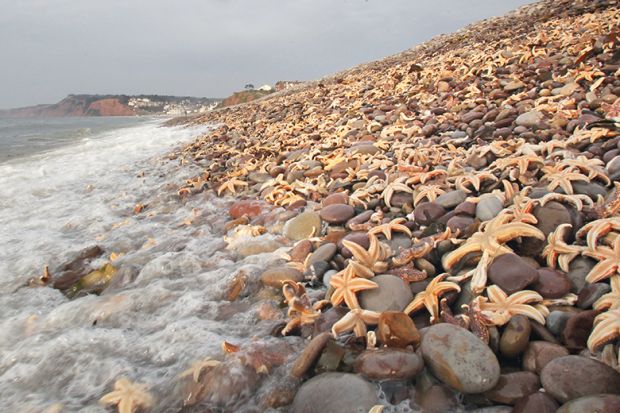Ocean Outbreak starts off like a horror movie. It is December 2013, and starfish are dying at catastrophic rates off the west coast of the United States. Drew Harvell describes bodies piling up on the sea floor, dismembered arms walking off on their own. Replace starfish with practically any other species, and you have yourself an international headline. Many disease-causing agents can live freely in seawater, not a problem we have on land, so why is nobody talking about it?
Coral, abalone, salmon and starfish. The seemingly random assortment of animals discussed in this book, in peril at the hands of disease, gives us an insight into how it is not just commercially important species, those that we as humans have a hungry vested interest in, that are important enough to be studied.
In an account that is partly a memoir, Harvell talks fondly of her colleagues, students and collaborators. She translates complicated science and years of research into easy-to-read stories, keeping her life as a scientist at the heart of the narrative. This style of writing is unusual among academics, which makes it all the more thought-provoking. The author’s obvious deep love of the ocean and its inhabitants allows her to conjure up rich images of her fieldwork abroad: remote white sandy beaches, scuba-diving to look for diseased sea fans (which would otherwise seem quite unglamorous), with tales of jaw-chomping barracuda to boot. No doubt this will help inspire future marine biologists, who appear to be sorely needed.
A delicate subject discussed at length, and one that Harvell handles with great tact, is the pathogen spillover from aquaculture, or fish farms. On one hand, she praises salmon farmers for having bred animals that reach maturity in a mere two years, yet the irony is that “aquaculture can breed pathogens as well as seafood”. This leads us on to another tricky but well-thought-through topic: climate change. Harvell notes that warm waters do not just stoke disease but can kill animals outright from heat stress. The slight increases in ocean temperatures we are experiencing can give rise to bacteria and viruses, tipping whole species over the edge, as she has been witnessing first-hand.
The book offers an insight into how research projects are conceived, how they develop and the accompanying struggles, although Harvell notes that “scientists cannot figure out the causes of disease epidemics without funding and investment in needed infrastructure”. Ocean Outbreak has an ominous ring to it, but despite leaving us thinking that the oceans are a vast soup of pathogens just waiting for the right host and temperature, the book ends on a hopeful note. Nature is seemingly fighting back. Seagrasses, which are flowering plants growing in the shallows, are filtering out pathogens and pollutants that might otherwise reach the open oceans. Organisms produce their own viruses which can fight off microbes. This book is a must-read for all who care about the future of our oceans.
Charlotte Davies is a postdoctoral researcher within the Comparative Immunology and Pathobiology group at Swansea University. Her work focuses on disease connectivity in marine ecosystems and she is currently working on the EU-funded BlueFish project.
Ocean Outbreak: Confronting the Rising Tide of Marine Disease
By Drew Harvell
University of California Press, 232pp, £21.00
ISBN 9780520296978
Published 16 April 2019
Register to continue
Why register?
- Registration is free and only takes a moment
- Once registered, you can read 3 articles a month
- Sign up for our newsletter
Subscribe
Or subscribe for unlimited access to:
- Unlimited access to news, views, insights & reviews
- Digital editions
- Digital access to THE’s university and college rankings analysis
Already registered or a current subscriber?




